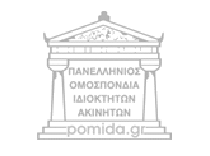Unfortunately, however, once again the constant and fair demand of property owners for rationalization of the income tax scale from rents, which is the only one that was not reduced in the past, is not being met years, and which is the only measure that can directly increase the supply of housing for rent. The encumbrances on the properties remain, while the obligations, many of which have no substantial counterpart for the owners (from the energy certificate and the electronic identity to the energy and functional upgrading of the buildings), the commitments (prohibition outside the building plan, forestry, archaeological legislation , preserves, land registry, etc.) and bureaucracy (difficulties in transfers, delays in forest maps) are constantly multiplying and they are rampant, suffocating the citizens and strangling their trade.
POMIDA would never object to any measure that can actually help to reduce tax evasion. However, we point out that numerous interventions made in recent years in the real estate transfer process, managed to turn it into a real multi-month “Calvary” for all involved. Therefore, every measure concerning the process of real estate transfer should be seriously studied before being implemented in order not to have the opposite of the intended results but also to achieve the goal.
In relation to yesterday’s announcements, we must point out the following:
1. Building insurance: Both everyday risks, as well as extreme weather phenomena, earthquakes, etc. threaten private property with destruction. The State is not intended and cannot be the free physical insurer of private buildings. POMIDA argues that the universal insurance of private buildings is absolutely necessary, both because it is the only measure that can ensure the restoration of citizens’ properties, and because it will free the State from hundreds of millions of euros in compensation, which it will allocate from taxation of the citizens, for partial and only restoration of the damages. However, it cannot be implemented unless citizens are supported with serious tax and other incentives.
Specifically, beyond the symbolic 10% discount in ENFIA that applies only to residences, there should be a full deduction of the insurance premiums from the taxable income of the insured owners. This is possible, given that the insurance market operates with absolute tax transparency and compliance, and yields such large tax revenues to the State that it is fiscally easy and advantageous to substantially subsidize the insured individuals. Finally, the state aid should cover the 2% – 4% for insured citizens that, as exempt, is not covered by the insurance companies.
2 .Short-Term Rentals: Income from short-term rentals has allowed thousands of landlords in past years to renovate their properties, be consistent with their tax obligations and offer in the national economy revenue and foreign exchange. If the State wants to deal with the housing problem, it should ensure that the hundreds of thousands of closed properties are modernized and not the properties that were opened and modernized to be made available for short-term rental.
In any case we consider that the limit of three properties set in order to include the activity mandatory for VAT is very small and suffocating, and will lead (due to the operational costs involved) to the exit of thousands of small owners from the market and loss of revenue for them and the State, or even worse in the underground economy which is the biggest distortion of competition .






